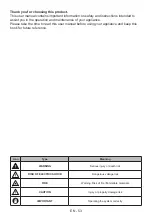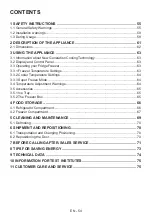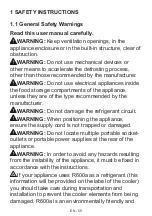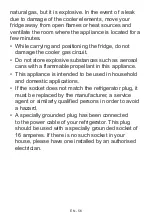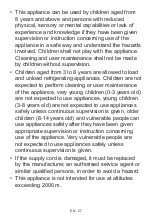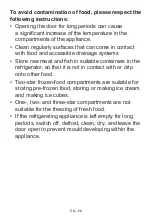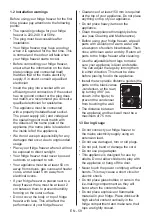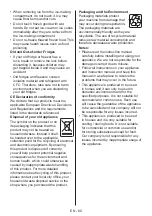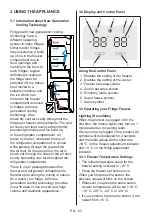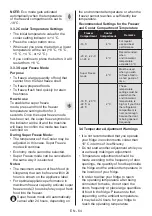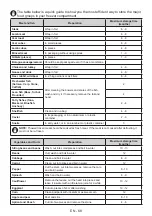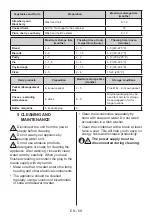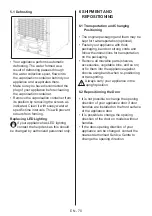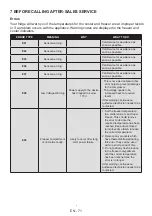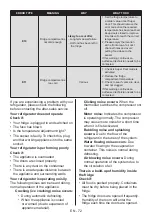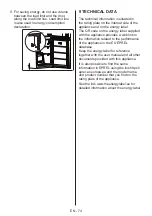
EN - 67
Food
Maximum
storage time
How and where to
store
Bottled
products
e.g. milk
and
yoghurt
Until the
expiry date
recommended
by the
producer
On the designated
door shelf
Eggs
1 month
On the designated
egg shelf
Cooked
food
2 days
All shelves
4.2 Freezer Compartment
•
The freezer is used for storing frozen
food, freezing fresh food, and making ice
cubes.
•
For freezing fresh food; wrap and seal
fresh food properly, that is the packaging
should be air tight and shouldn’t leak.
Special freezer bags, aluminum foil
polythene bags and plastic containers
are ideal.
•
Do not store fresh food next to frozen
food as it can thaw the frozen food.
•
Before freezing fresh food, divide it into
portions that can be consumed in one
sitting.
•
Consume thawed frozen food within a
short period of time after defrosting
•
Never place warm food in the freezer
compartment as it will thaw the frozen
food.
•
Always follow the manufacturer's
instructions on food packaging when
storing frozen food. If no information is
provided food, should not be stored for
more than 3 months from the date of
purchase.
•
When purchasing frozen food, make sure
that it has been stored under appropriate
conditions and that the packaging is not
damaged.
•
Frozen food should be transported in
appropriate containers and placed in the
freezer as soon as possible.
•
Do not purchase frozen food if the
packaging shows signs of humidity
and abnormal swelling. It is probable
that it has been stored at an unsuitable
temperature and that the contents have
deteriorated.
•
The storage life of frozen food depends
on the room temperature, the thermostat
setting, how often the door is opened,
the type of food, and the length of time
required to transport the product from
the shop to your home. Always follow the
instructions printed on the packaging and
never exceed the maximum storage life
indicated.
•
The maximum amount of fresh food (in
kg) that can be frozen in 24 hours is
indicated on the appliance label.
•
To use the maximum capacity of the
freezer compartment, use the glass
shelves for the upper and middle section,
and use the lower basket for the bottom
section.
•
Use the fast freezing shelf to freeze
home cooking (and any other food
which needs to be frozen quickly) more
quickly because of the freezing shelf’s
greater freezing power. Fast freezing
shelf is the bottom drawer of the freezer
compartment.
NOTE:
If you attempt to open the freezer
door immediately after closing it, you
will find that it will not open easily. This
is normal. Once equilibrium has been
reached, the door will open easily.
Important note:
•
Never refreeze thawed frozen food.
•
The taste of some spices found in cooked
dishes (anise, basilica, watercress,
vinegar, assorted spices, ginger, garlic,
onion, mustard, thyme, marjoram, black
pepper, etc.) changes and they assume
a strong taste when they are stored for a
long period of time. Therefore, add small
amounts of spices to food to be frozen, or
the desired spice should be added after
the food has thawed.
•
The storage time of food is dependent
on the type of oil used. Suitable oils are
margarine, calf fat, olive oil and butter.
Unsuitable oils are peanut oil and pig fat.
•
Food in liquid form should be frozen in
plastic cups and other food should be
frozen in plastic folios or bags.

